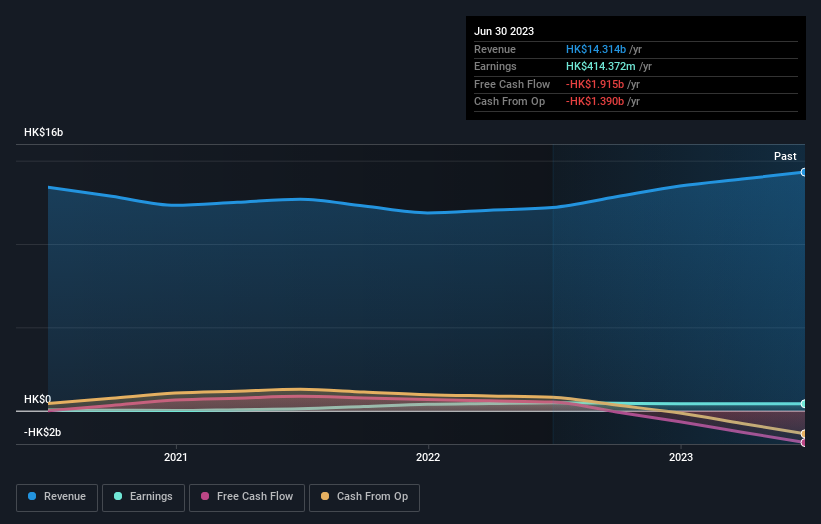- Hong Kong
- /
- Retail Distributors
- /
- SEHK:693
Tan Chong International Limited's (HKG:693) largest shareholders are private companies who were rewarded as market cap surged HK$302m last week

Key Insights
- Tan Chong International's significant private companies ownership suggests that the key decisions are influenced by shareholders from the larger public
- The top 3 shareholders own 57% of the company
- Insider ownership in Tan Chong International is 15%
A look at the shareholders of Tan Chong International Limited (HKG:693) can tell us which group is most powerful. The group holding the most number of shares in the company, around 54% to be precise, is private companies. In other words, the group stands to gain the most (or lose the most) from their investment into the company.
As a result, private companies were the biggest beneficiaries of last week’s 11% gain.
Let's delve deeper into each type of owner of Tan Chong International, beginning with the chart below.
See our latest analysis for Tan Chong International

What Does The Lack Of Institutional Ownership Tell Us About Tan Chong International?
Institutional investors often avoid companies that are too small, too illiquid or too risky for their tastes. But it's unusual to see larger companies without any institutional investors.
There are multiple explanations for why institutions don't own a stock. The most common is that the company is too small relative to funds under management, so the institution does not bother to look closely at the company. Alternatively, there might be something about the company that has kept institutional investors away. Tan Chong International might not have the sort of past performance institutions are looking for, or perhaps they simply have not studied the business closely.

We note that hedge funds don't have a meaningful investment in Tan Chong International. Our data shows that Tan Chong Consolidated Sdn Bhd is the largest shareholder with 35% of shares outstanding. Meanwhile, the second and third largest shareholders, hold 12% and 11%, of the shares outstanding, respectively. Eng Soon Tan, who is the second-largest shareholder, also happens to hold the title of Top Key Executive.
To make our study more interesting, we found that the top 3 shareholders have a majority ownership in the company, meaning that they are powerful enough to influence the decisions of the company.
While it makes sense to study institutional ownership data for a company, it also makes sense to study analyst sentiments to know which way the wind is blowing. Our information suggests that there isn't any analyst coverage of the stock, so it is probably little known.
Insider Ownership Of Tan Chong International
The definition of an insider can differ slightly between different countries, but members of the board of directors always count. Company management run the business, but the CEO will answer to the board, even if he or she is a member of it.
Most consider insider ownership a positive because it can indicate the board is well aligned with other shareholders. However, on some occasions too much power is concentrated within this group.
Our information suggests that insiders maintain a significant holding in Tan Chong International Limited. Insiders own HK$458m worth of shares in the HK$3.0b company. We would say this shows alignment with shareholders, but it is worth noting that the company is still quite small; some insiders may have founded the business. You can click here to see if those insiders have been buying or selling.
General Public Ownership
The general public-- including retail investors -- own 30% stake in the company, and hence can't easily be ignored. While this group can't necessarily call the shots, it can certainly have a real influence on how the company is run.
Private Company Ownership
Our data indicates that Private Companies hold 54%, of the company's shares. Private companies may be related parties. Sometimes insiders have an interest in a public company through a holding in a private company, rather than in their own capacity as an individual. While it's hard to draw any broad stroke conclusions, it is worth noting as an area for further research.
Next Steps:
It's always worth thinking about the different groups who own shares in a company. But to understand Tan Chong International better, we need to consider many other factors. Consider for instance, the ever-present spectre of investment risk. We've identified 4 warning signs with Tan Chong International (at least 2 which don't sit too well with us) , and understanding them should be part of your investment process.
If you would prefer check out another company -- one with potentially superior financials -- then do not miss this free list of interesting companies, backed by strong financial data.
NB: Figures in this article are calculated using data from the last twelve months, which refer to the 12-month period ending on the last date of the month the financial statement is dated. This may not be consistent with full year annual report figures.
Valuation is complex, but we're here to simplify it.
Discover if Tan Chong International might be undervalued or overvalued with our detailed analysis, featuring fair value estimates, potential risks, dividends, insider trades, and its financial condition.
Access Free AnalysisHave feedback on this article? Concerned about the content? Get in touch with us directly. Alternatively, email editorial-team (at) simplywallst.com.
This article by Simply Wall St is general in nature. We provide commentary based on historical data and analyst forecasts only using an unbiased methodology and our articles are not intended to be financial advice. It does not constitute a recommendation to buy or sell any stock, and does not take account of your objectives, or your financial situation. We aim to bring you long-term focused analysis driven by fundamental data. Note that our analysis may not factor in the latest price-sensitive company announcements or qualitative material. Simply Wall St has no position in any stocks mentioned.
About SEHK:693
Tan Chong International
An investment holding company, engages in the manufacturing, distribution, and retail of vehicles and related spare parts.
Slight with imperfect balance sheet.


